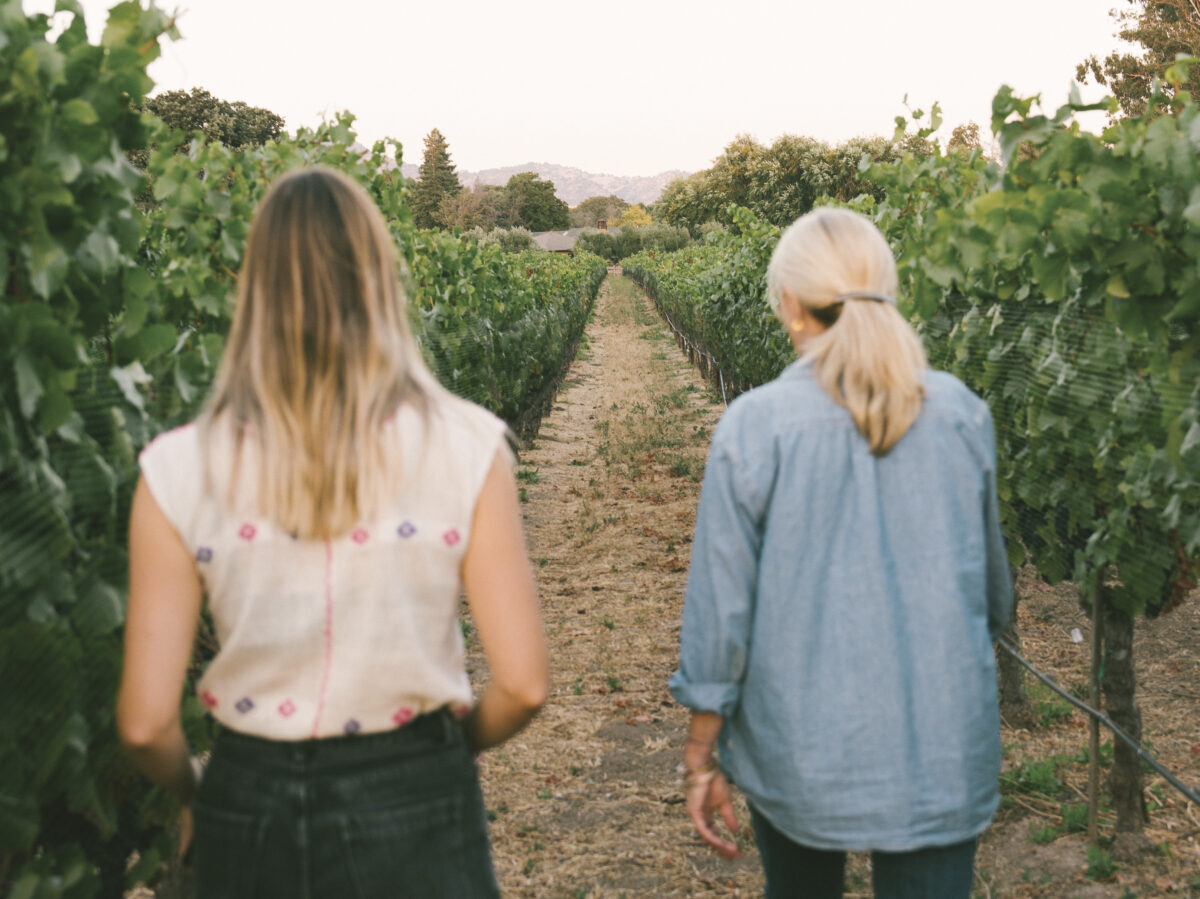SIP Feature
The Future of Blue Farm is Green
With a Bit of Magic
WRITTEN BY Layne Randolph
|
Published On: August 28, 2024

Hannah Gropman and Anne-Moller Racke // Photo by Mike Battey
Set against Sonoma’s agrarian backdrop, Blue Farm Wines produces Grand Cru-style Pinot Noir and Chardonnay from five vineyards across Sonoma County. The wines, renowned for their complexity, expressiveness, and craftsmanship, are a product of Anne Moller-Racke’s vision. The founder of Donum Estate, Anne planted seven acres of Pinot Noir behind her Victorian farmhouse in Sonoma, setting the stage for the birth of Blue Farm.
The farming practices and care given to grape growing undoubtedly contribute to the wine’s quality. But the decision to transition to organic farming and cease using Roundup has unveiled a hidden magic. The land, once quiet, now teems with life, with ladybugs, jackrabbits, and frogs making a vibrant return. The resurgence of biodiversity is evidence of the power of refraining from harm and letting nature thrive.
Since joining her mom in vineyard operations, Hannah Gropman has been on a quest to explore the latest farming methods. Her heart has always led her to natural practices. “We may not be certified organic, but all our practices are organic. As a reasonably small vineyard, the certification process may not be the most practical for us.” Their commitment to organic farming is not just a label; it’s a way of life. It’s evident in their weed prevention methods, which are all hand-done with weed whackers, a time-consuming but sustainable approach.
When moving to organic farming, plants under the vines suddenly grow wild and overgrown. Vines are self-pollinating, but by attracting pollinators and promoting more foliage, biodiversity is enhanced, which creates richer, healthier soil. Without this, the soil can become lifeless.
The biggest challenge for most vineyards in California is the need for more water, but not at Blue Farm. “Our vineyard is planted on an old riverbed, so we have good water holding capacity. Still, we are mindful and intentional with our irrigation. As we slowly replant the vineyard over time, we will use a deeper root system to help us use even less water.”
Gropman’s vineyard focus extends to her thought-provoking outlook on natural wine. “I am more interested in the vineyard’s health and environment than in minor cellar interventions like whether or not to add sulfur.” Yet Gropman appreciates the efforts of natural winemakers because they are introducing younger wine drinkers to higher-priced wines made without chemicals. “They’re beautifully priming people to be more curious about how their wine is being made and what they’re putting into their bodies. It’s a great segue to the wine we make, which I would consider natural because we farm organically and use very minimal intervention in the cellar, even though we do not advertise our wine as natural.”
“Joy Wesley of Bee Focused introduced me to different plants and ways of working in concert with the land to incorporate more habitat for pollinators. I consider her my mentor; she’s the one I bounce ideas off of about which plants to plant and how best to introduce more beneficials to the little Blue Farm ecosystem.” The result is an ongoing display of nature. “This property is small, but it has just a bit of magic to it.”
